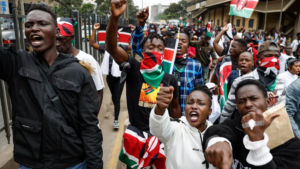“I have an urgent matter to attend to,” my son David declared confidently, surprising his colleagues as he excused himself from a critical board meeting. What was his urgent matter? Kenya’s iconic Safari Rally. I smiled, not out of surprise but recognition, seeing myself vividly reflected in his excitement. Years ago, my life paused whenever rally legend Colin McRae’s powerful Subaru Impreza roared past, filling my heart with unmatched thrill. Unknowingly, I had planted a seed of enthusiasm that now blooms passionately within David, and countless Kenyans, drawing them away from their daily routines and uniting diverse groups in celebration of this beloved motorsport tradition.
The Safari Rally represents much more than just motorsports. It embodies Kenya’s cultural heritage and serves as an international symbol of determination and sporting excellence. Established in 1953 and originally covering nearly 5,000 kilometers across Kenya, Uganda, and Tanzania, its legendary difficulty earned it the title of “the world’s toughest rally,” captivating millions around the globe and significantly enhancing Kenya’s global profile.
Despite its celebrated status, current challenges cast a shadow over the future of East Africa’s beloved tradition. Leadership instability, questionable financial practices, and operational mishaps have compromised the rally’s credibility. Respected figures such as Patrick Njiru have publicly voiced concerns regarding transparency, while media organizations protest unfulfilled financial commitments. Moreover, credible reports suggest significant unpaid obligations to critical partners and sponsors.
Ignoring these management issues poses a severe threat to the rally’s immense economic potential. Historically, the Safari Rally has been an economic powerhouse, injecting billions into Kenya’s economy, notably contributing KSh 38 billion in 2021 and drawing over 100,000 spectators. The rally significantly boosts local businesses, stimulates tourism, and revitalizes regional economies. Continued mismanagement endangers these critical economic benefits.
Equally vital is the rally’s role in inspiring unity and passion among Kenyan youth and broader communities. Rally heroes such as Joginder Singh and global icons like Colin McRae have ignited dreams, nurturing values like resilience, discipline, and teamwork through the years. Today, this rally spirit continues to bring together communities from diverse backgrounds, transcending barriers and fostering national unity.
The good news is that the 2025 Safari Rally introduced innovative changes, such as the thrilling Mzabibu stage at Morendat Farm vineyards, rejuvenating public interest. However, we cannot allow these promising developments to mask significant weaknesses that require immediate action.
To restore and safeguard the Safari Rally’s legacy, I propose five practical recommendations. First, implementing strict financial transparency and accountability must become a priority. Second, selecting leadership based on proven integrity, competence, and dedication is critical to achieving lasting stability. Third, enhancing consistent, transparent communication with all stakeholders, including media, sponsors, drivers, and local communities. This is essential for rebuilding trust. Fourth, integrating environmentally sustainable practices, such as electric or hybrid vehicles and improved waste management, would position the rally within global sustainability standards. Finally, a deliberate strategy of actively involving local communities in planning and sharing economic benefits would ensure continued grassroots support and lasting community engagement.
As renowned rally driver Patrick Njiru wisely reminds us, “We cannot allow internal disputes to undermine what generations of Kenyans have proudly built. The Safari Rally belongs to us all, and its legacy demands vigilant protection.”
Today, we find ourselves at a pivotal moment. Our actions, or inaction, will determine the rally’s future. Restoring the Safari Rally’s esteemed status is not merely about motorsport prestige; it involves reclaiming our heritage, fostering economic vitality, championing environmental responsibility, and inspiring the dreams of our youth.
Let us courageously embrace these challenges to preserve and enhance the Safari Rally for David, for our youth, and future generations. Our young people are authentic and quality ‑conscious, they have no patience with events and institutions that don’t live up to their promises. And so, the time to act to save the Safari Rally is now. Think green, act green!



